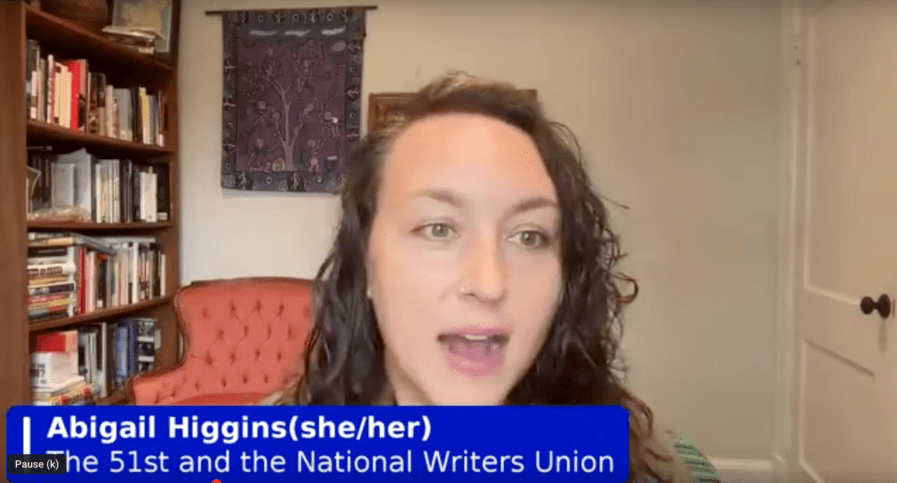How Policy Change and Organizing Can Address the Local-News Crisis

“A primary job of journalists has to be ensuring that there is journalism for the generations that follow us,” said Abigail Higgins.
From devastating public-media cuts to assaults on press freedom to the continued hollowing-out of independent newsrooms, our media system is facing a series of existential crises.
How can we fight back while laying the groundwork for a local-media system that truly serves our communities? What policy changes does this moment demand — and how can we build power at the state and local levels to make it happen?
What our panel taught us about the fight for local journalism
On Sept. 10, Free Press Action hosted a panel discussion to tackle these questions. Our conversation featured three speakers with unique perspectives: State Rep. Chris Rabb (D–Philadelphia); Victor Pickard, co-director of the Media, Inequality & Change Center; and Abigail Higgins, co-founder of the 51st and first vice president of the National Writers Union. They broke down how lawmakers, journalists and advocates can organize to create a better future for local news. Mike Rispoli, Free Press Action’s senior director for journalism and civic information, moderated the discussion.
Here’s what we covered:
State Rep. Chris Rabb discussed his two-pronged proposal to support local news: The first bill would create a consortium — modeled off the New Jersey Civic Information Consortium — to provide grants for community newsrooms and local-media initiatives. The second would establish a fellowship program to support a more diverse and sustainable pipeline of journalists.
“Out of 67 [counties in Pennsylvania], 17 have one or fewer newsrooms left. And they’re largely in rural districts … Those folks need good, solid, substantive, balanced information,” said Rabb. He stressed the bipartisan potential of this work, and how it “transcends partisanship … it benefits folks from all ideologies and all geographies.”
Rabb also emphasized the human dimension of strong local news, and its benefits for civic health. “It allows opportunities to engage in good faith with people who have different perspectives and lived experiences … The better I understand their stories and their narratives [as a legislator] … the better it’ll help me be a public servant.”
He urged Pennsylvania residents to take action once he formally introduces the bills: Reach out to committee chairs, provide feedback on the legislation, and support transparency and accountability in grant allocation.
Abigail Higgins brought a journalist’s perspective to the discussion. She shared the story of The 51st, a worker-run outlet in Washington, D.C., that emerged after the sudden closure of DCist, a local outlet affiliated with public-media station WAMU. “Before we even launched last year, The 51st ran the most successful crowdfunding campaign in worker-owned news history … We raised over $276,000 from over 3,400 contributors before we had published a single article.”
Even with this success, Higgins emphasized the need for public investment: “$5, $10, $20 monthly donations does not an entire newsroom build. We really need to continue talking about the responsibility of politicians and legislators to help us do this work.”
She also highlighted the broader responsibility journalists face at a crisis moment for the field — and for our democracy. “Our main job as journalists can’t just be storytelling anymore. A primary job of journalists has to be ensuring that there is journalism for the generations that follow us.” Higgins argued that advocacy, union work and public engagement are essential to sustaining a strong, independent press.
Victor Pickard, Free Press Action’s board chair and a longtime thought leader in the media-policy arena, called for transformative solutions to the news crisis. “It’s absolutely key that we make sure we’re not just propping up and restoring the status quo and failing commercial models, but that we’re actually transforming our media system from the ground up.” He cited experiments like DC’s Local News Funding Act and an effort in Seattle to create a media-voucher program as examples of democratic approaches to supporting local journalism.
All three speakers underscored a shared conclusion: To create a sustainable future for local news, we need bold policies, public investment and community engagement. “Crisis is also an opportunity,” Higgins said. “We have an outsized opportunity and an outsized responsibility to create solutions to the massive information crisis.”
Watch the discussion of how to fund local news.
Ready to join the movement? Free Press Action facilitates the Media Power Collaborative (MPC), a national coalition of nearly 300 media leaders, community advocates, researchers and funders who are advancing a bold new policy agenda for local news. Learn more about the MPC and sign up for its email list.